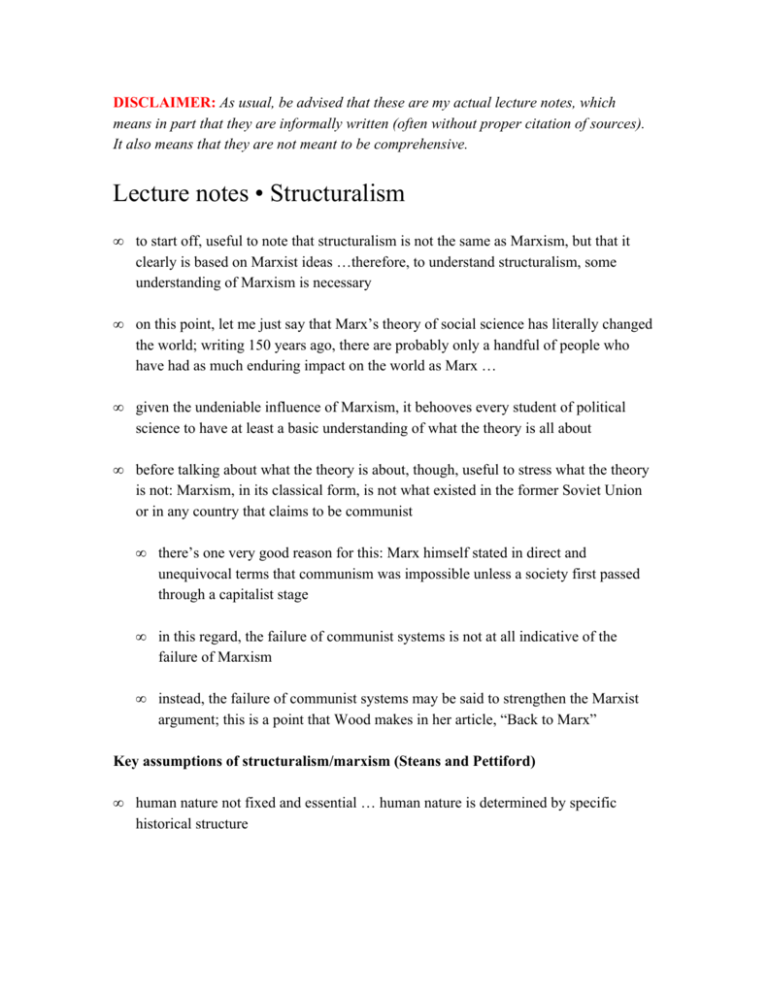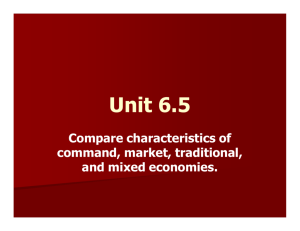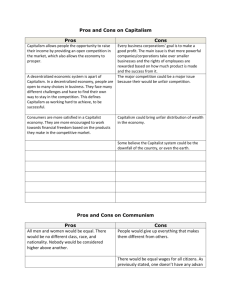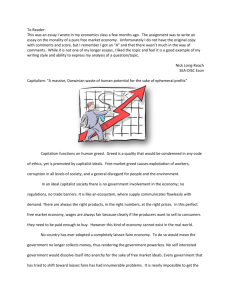Lecture notes • Structuralism - Cal State LA
advertisement

DISCLAIMER: As usual, be advised that these are my actual lecture notes, which means in part that they are informally written (often without proper citation of sources). It also means that they are not meant to be comprehensive. Lecture notes • Structuralism • to start off, useful to note that structuralism is not the same as Marxism, but that it clearly is based on Marxist ideas …therefore, to understand structuralism, some understanding of Marxism is necessary • on this point, let me just say that Marx’s theory of social science has literally changed the world; writing 150 years ago, there are probably only a handful of people who have had as much enduring impact on the world as Marx … • given the undeniable influence of Marxism, it behooves every student of political science to have at least a basic understanding of what the theory is all about • before talking about what the theory is about, though, useful to stress what the theory is not: Marxism, in its classical form, is not what existed in the former Soviet Union or in any country that claims to be communist • there’s one very good reason for this: Marx himself stated in direct and unequivocal terms that communism was impossible unless a society first passed through a capitalist stage • in this regard, the failure of communist systems is not at all indicative of the failure of Marxism • instead, the failure of communist systems may be said to strengthen the Marxist argument; this is a point that Wood makes in her article, “Back to Marx” Key assumptions of structuralism/marxism (Steans and Pettiford) • human nature not fixed and essential … human nature is determined by specific historical structure • the interests and understandings of human beings are largely determined by a collective identity (or class status), which, in turn, is defined by the economic system as a whole (more on this is a minute) • structualism is both a science and ideology … as a science it purports to tell us about the fundamental nature of the world in which we live • structuralists make no clear distinction between the national and international Some basic aspects in Marxism: 1. Class analysis: unlike Realism or liberalism, the basic unit of analysis in Marxism is class • the assumption is that those who occupy the same socioeconomic class share certain common characteristics and interests, which compel them to act in certain ways —e.g., capitalists, because they are capitalists, must exploit labor to earn a profit • the division of classes in society also creates basis for struggle • unit of analysis critical—must pay attention to UOA when doing analytical assignments • why? because it will have a fundamental impact on how your analyses develops - consider Marxist perspective on state: in classical writings, the state is depicted as being nothing more than an agent—or tool—acting at the behest of the dominant class (which is the capitalist class) - in this sense, state has no autonomy, no independence, simply reflects the interests of the ruling class; for this reason, then, focusing on the state as if it were an independent actor is a fundamental error - this notion that the state is nothing but a tool of the dominant class was later modified: most structuralists today agree that the state has relative autonomy, which tends to vary depending on the circumstances; still, in the long run, Marxists agree that the state cannot escape from its dependence on the owners and controllers of capital, which means that, when we analyze what the state does, we must always return to the premise that its actions are at least partly determined by other actors - open to discussion: what about this assumption? does it have a solid basis? or are structuralists all wrong about the nature of the state? - for the same reason, it is important to note, structuralists do not focus on individuals; individual action is profoundly shaped by class relations; there is freedom to act, but this freedom is severely limited 2. a structural understanding of human history and human society suggests that history (and human action) is largely determined (shaped, molded) by the larger social structure (one criticism of structuralism, as noted by Steans and Pettiford) • this notion of structuralism is most apparent in a famous quote of Marx: “Men make their own history, but they do not make it just as they please; they do not make it under circumstances chosen by themselves, but under circumstances directly encountered, given and transmitted from the past” (18th Brumaire of Louis Bonaparte) • Meaning: humans make their own history because they possess the power of selfdetermination; however, human action is necessarily shaped by external constraints inherited from the past • one of the most important external constraints derives from the economic system, or dominant mode of economic production; for the past several hundred years, of course, this has been capitalism …the social organization of capitalism has an undeniable and powerful impact on all aspects of our lives • consider an example: If a 100,000 person community wants to live off the land, to completely isolate themselves completely from “modern society,” can they do it? They may be able to achieve some isolation, but only if they obey they basically abide by the rules of a modern, capitalist society: for example, they cannot simply claim land, they need to buy it; they can create their own system of governance, but only insofar as it does not challenge or subvert the laws of state in which their commune is located; they must also pay taxes; and so on … • • to achieve total isolation, then, is virtually impossible: and as long as they do not achieve total isolation, their actions will be governed by institutional forces and deeper, structural forces … this is a simplistic example, but the main point is clear: even in democratic societies, people cannot do as they please … *** • a second tenet: economic relations in capitalist system are inherently exploitative; exploitation takes the form of class struggle - the idea of exploitation is key to logic of Marxism, for if the system is not inherently exploitative, then there would be no logical endpoint for capitalism—capitalism could literally go on forever (note that this is really a key distinction between liberalism and Marxism: liberals argue that capitalism is the endpoint of humanity’s social evolution because; refer to Fukuyama) - it is easy to dismiss the idea that exploitation is built into the system, especially when we look around and see the tremendous strides that the typical American (or Western European, or Japanese, or even South Korean) has made; yet, one can also not deny the continued existence of poverty and exploitation on a global scale - in fact, structuralists would argue that the prosperity that workers in the West and few other places enjoy is literally built on the backs of the peoples of the Third World … and there is plenty of empirical evidence to support this view: all one need do is look back at the evolution of capitalism … started off in Western Europe and quickly expanded to North America; once firmly established, however, capitalist nations soon started to expand aggressively to other parts of the world; i.e., the age of imperialism • so why is capitalism inherently exploitative? • simple answer: relations between two classes are necessarily unequal: owners of capital have built-in advantage over workers; this inequality does not in itself lead to exploitation, but it is an essential foundation; it makes exploitation possible • this leads to an obvious question: can’t capitalist behave in a non-exploitative way? • the short answer is no: why? • • because a unavoidable imperative in capitalism is the need for profit: capitalists (i.e., those who owns the means of production) must accumulate profit in order to survive ... refer to story of the “kind-hearted capitalist” -- a man who wants to provide a better life for his workers and his community. • What would he do to achieve this? Well, he could raise wages, provide better health benefits, build a child care center, fund a generous retirement program, etc. As a capitalist, however, doing such ‘good deeds’ raises his costs; his firm, in short, becomes less competitive vis-à-vis other firms. If these other firms further undercut him by moving production offshore—say, to Indonesia, where the state uses its military and police powers to break unions and suppress wages—the ‘good hearted’ capitalist may not be able to compete at all. If this happens, he may be forced to lay off workers, reduce wages, eliminate health care benefits, ignore environmental and safety regulations, or cease production altogether; or he may move his factory overseas, too. So, the next time you hear of a factory closing its doors to move to another country—or even to another state where unionization is weaker— you might want to keep this in mind • The main point, to repeat, is this: the imperatives of competition, accumulation, and profit-maximization make it necessary for capitalists to exploit the workers they employ. This is the structural context of capitalism, which we simply cannot ignore. • and how is capital accumulated? Several ways: (1) stepping up the intensity of work, so that with same labor power and machinery, more goods are produced (i.e., increasing productivity), (2) keeping the costs of production (including or especially wages paid to workers) as low as possible relative to the value that is produced—can be achieved by opening new labor markets; (3) replace labor with more productive technologies (e.g., use of robots and other automated machinery) • the need to keep production costs as low as possible raises a problem: to achieve a profit, capitalists also need to sell their products in the market — but, if workers cannot afford to buy products, then profits will decline ... this points to another key aspect of Marxist argument, namely, that capitalism produces contradictions • notion of contradictions key to marxist analysis, for it tells us why the system must ultimately crumble • as long as new markets existed, argued Marx, capitalism was safe (contradictions could be overcome), but the existence of new markets is not boundless ... in this regard, Marxists point to a cycle of booms and slumps ... booms are most often the result of dramatic technological change, which creates whole new markets ... during the boom, capitalists would build new plants and install new machinery, but soon a stage of over-production would be reached, and a slump would follow • Marxists argue that this cycle has limits — slumps become longer and booms shorter ... in the end, Marx argued that the cycle of booms and slumps would create greater exploitation of workers until, at some point, a revolutionary change in ownership of the means of production would occur, which would lead to the end of capitalism • Marx, however, seemed to have been proved wrong: the contradictions he talked about just didn’t seem to lead to his prediction about the collapse of capitalism • one avenue of escape from this profit trap was for capitalists was to move overseas: cheaper material, cheaper labor, and access to additional markets (by paying less for foreign labor and raw materials, capitalists could pay more to domestic workers) ... this allowed new growth and further spread of capitalism. • this is what both Hobson and Lenin argued (in slightly different ways) • Lenin and Hobson, for example, argued that capitalism contributes to overproduction and underconsumption, to lower wages and lower employment for the working class, and to falling rates of profit • the solution was expand capitalism across the globe (in Lenin’s view this would have led to development in the Third World, which, in turn, would have led to increased competition and rivalry, which would have eventually created basis for collapse of capitalism … obviously, his analysis erred as well) • still, Marxists understood that capitalism could never be contained in a single country and that ‘capitalists’ as a class would never be constrained by nationalism • - note how Marxists clearly understood globalizing logic of capitalism long (long) before globalization became common concept another problem with imperialism: if it was true that capitalism needed to expand, how could Marxists account for the fact that capitalism continued to thrive even after the period of imperialism ended? - this was resolved through concept of neocolonialism …a strategy that allowed Western capitalists to give up direct political control of Third World countries, but maintain economic control • this was the main thesis of dependency scholars … • Basic tenets of dependency theory • first has to do with source of TW problems: the fundamental source, of course, is capitalism, but the more specific source are the structural relations capitalism fosters between the richer, more economically advanced economies of the core and the poorer economies of the periphery • this core-periphery is primarily one between countries, but also involves a class alignment, where the elites of the TW act as intermediaries between the dominant capitalist class of the core and the subjected local peoples within their own countries • in this manner, the interests of local elites (in the post-colonial era) has tended to coincide more strongly with the interests of foreign capitalists than with their own people • second has to do with possibilities for development: here the views are different …early theorists argued that development was impossible: The Development of Underdevelopment (this was hyperstructural argument, which really allowed no room for agency) • this view changed as it became apparent that some development in the periphery was possible (e.g., Asian NICs) …the response was the notion of dependent development • refer to Cardoso and Faletto; they argue that situations of dependency are not necessarily the same: in some cases, dependent relationships can lead to relatively rapid industrial development; in other cases, it makes development virtually impossible … particular historical circumstances matter - development has becomes more possible because of the changed nature of capitalism … earlier stage of capitalism was based on increased investment in and control of raw material sources and agriculture … control over these resources was needed to keep production costs low … today, however, investment is geared more toward industrial goods and exports … in this regard, makes more sense to invest in productive rather than purely extractive industries; this allows for limited degree of capitalist development in TW • Third, prescriptions for change …here there’s also some disagreement …some believe the only hope of change is for TW countries to follow strategy of de-linking; others argue that no strategy can work as long as overall system of exploitation remains in place • dependency is largely out of vogue today, but still contains some powerful insights about nature on capitalism in international system • reiterate main argument: capitalist development in Third World cannot be understood without reference to broader external relationships and the connection between external factors and internal development… • these connections, in turn, are part of larger and relatively stable global structure … dependency scholars argue that any analysis of capitalist development must start from here (rather than at the level of the nation-state) • repeat logic of argument: capitalism is exploitative not only domestically but internationally as well; in other words, the development (or lack thereof) of certain countries is conditioned by the development and expansion of another economy to which the former is subjected … it is an interdependent relationship, but one that is highly and structurally unequal • here we can see that the alleged backwardness of some economies is not due to a lack of integration into the world economy (as some argue), or an unwillingness to fully adopt capitalist practices, but to the exploitative nature of global capitalism itself (this has particular relevance today) • in sum, the concept of dependence forces us to see the relationship between the national and international; between the political and the economic; also, forces us to incorporate power into our analysis of capitalist development … • How does structuralism help us understand IR? • open to discussion first …one way to answer this question is to consider the themes discussed by Steans and Pettiford • state and power …structuralism tells us to interpret behavior of state in ways very different from realism and liberalism … assumes that state actions, at basic level, necessarily reflect the interests of dominant social classes • • the manifestations of this class interest are not always obvious and are often disguised as something else … i.e., state is said to act in national interests, but structuralists ask: How is the national interest defined? • consider US interventions in Central America and throughout the TW…US supported repressive, authoritarian and murderous regimes … difficult to see how this supported the interests of the typical American citizen, but not so difficult to see how it supported US corporate interests … • structuralists argue that history of US foreign policy in post-war era has been a history of efforts to support expansion and deepening of global capitalism, which ultimately is to the benefit of major corporate actors understanding of state action must also take into account the relative power of the state, where power is defined in primarily economic terms …also note that, even here, power is subtle: as authors put it, “Power is embedded in social relations; that is, it is part of the structure. Power thus involves the inequalities of capitalist class relations and core-periphery relations. It also involves less tangible ideas such as persuasion and may be ‘invisible.’ One person or group may have power over others not just through threats and coercion but via ideology and manipulation. In this way power relations may come to be seen as such a ‘natural order’ of things; no one is consciously aware that it is being exercised.” (p. 87) • in structural view, then, power in international system is pervasive, but well-hidden … we can see “globalization” as part of this power equation: globalization, from structural view, is an effort to reinforce and legitimize existing system—which clearly benefits some groups more than others …the trick is to get everyone—including those who are most oppressed—to buy into the system … • akin to the “happy slave” analogy • emphasize the role of ideology in IR … • structuralism also helps us to understand IR by showing us how economic processes have a fundamental impact on the world … the clearest manifestation of this impact is the ongoing restructuring of the network of global production processes in order to overcome the obstacles to capital accumulation … • we can see this everywhere, but particularly in the institutional network that has arisen over the past several decades … IMF, WB, WTO, GATT, G-8, NATO, the EU/EC, NAFTA, FTAA, and so on are all representative of efforts to better “manage” and ensure expansion of global capitalism • of course, these institutions are designed to maximize the economic interests of the dominant capitalist states, and, as such, contribute to inequality and injustice in the world …they can’t really do anything else • this leads to another area in which structuralism helps us understand IR …namely, tells us that the key problems—key sources of conflict—in the world is not insecurity per se, but inequality and injustice …








